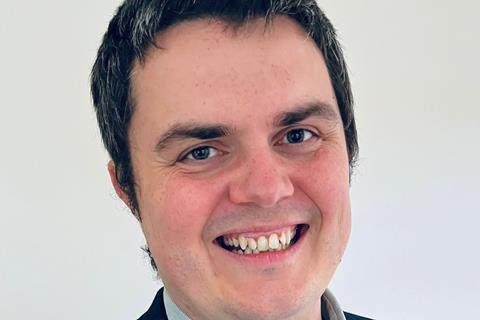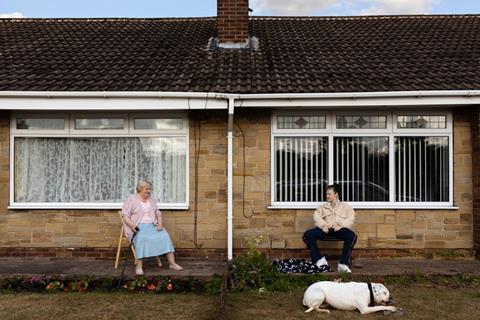
The Edinburgh International Film Festival (EIFF) returns on Thursday, August 14 for its second edition under the leadership of CEO and festival director Paul Ridd, alongside festival producer Emma Boa.
“I’ve always thought of this as being kind of like our year one, with last year being our year zero,” says Ridd, after he was tasked with reviving the festival for 2024 following a much-publicised period of flux.
The festival opens with Eva Victor’s comedy drama Sorry, Baby, which screened to acclaim at both Sundance and Cannes Directors’ Fortnight.
Features such as Campbell X’s UK-South Africa co-production Low Rider and Helen Walsh’s Cannes Great 8 title On The Sea are in the running for the £50,000 Sean Connery prize for feature filmmaking excellence.
This year’s EIFF features new venues, and a partnership between the industry programme and Amy Jackson and Lauren Dark’s nascent production company Unified, to help turbocharge the professional offering. Jackson, who produced Aftersun, is vice chair of the EIFF board.
Ridd talks to Screen about key learnings from 2024, programme highlights and finding inspiration in Bologna’s Il Cinema Ritrovato.
What have you tweaked and evolved from last year?
We’re in slightly different spaces. We’re delighted to be in the [recently reopened] Filmhouse, it’s great to be back in the Cameo, and we’re using Vue Omni for the first time this year.
Last year, we had a few pop-up spaces; this year, we have concentrated all of our pop-up initiatives into two spaces: the new cinema at the Hawthornden Lecture Theatre in the National Galleries of Scotland, and our main festival hub at Tollcross Central Hall, which is becoming fully ours this year.
We knew loud and clear we needed to come back with a proper festival hub so industry audiences and everybody could have a space to mingle and to do business, and to discuss films and spend time together.
We are still fully committed to the idea of more productively connecting the [Edinburgh] Fringe with the festival, so that pop-up principle isn’t going to go away. It’s very much part of what we want to do.
What are you most excited about in the programme?
There’s everything from family-friendly fare like Grow, which is a Scottish production through and through, to much darker work like Simon Rumley’s new film Crushed.
This year’s industry programme is much bigger in scale and more ambitious [than last year’s]. Film [screenings] are always front and central and the most important thing, but around that we have guests who emerge organically from those programmes – people like [director] Ben Wheatley and [producer] Andy Starke talking after their premiere Bulk, and Andrew Macdonald and Kevin Macdonald in conversation.
On top of that, there is everything we’re doing through the Unified collaboration, being able to secure people like [A24’s] Rose Garnett, [Film4 interim director] Farhana Bhula, [BBC Film director] Eva Yates, [US producers] Adele Romanski and David Hinojosa. These are amazing guests that our industry delegation is going to get meaningful experiences from.

Would you like to build more competition strands? A formal marketplace?
We’re not ruling out the possibility of more awards emerging, but for now, those are the two central building blocks of what we’re trying to do [the Sean Connery prize and the £15,000 Thelma Schoonmaker prize for shorts, with Schoonmaker taking part in an in conversation event].
Building a market is very important to us, and luring buyers and international distributors to Edinburgh to experience what we’re all about.
Cultivating the world-premiere landscape where you really will be seeing things for the first time is very important.
You’ve namechecked Toronto, Telluride and Sundance in the past as festivals from which you have taken inspiration. What are the smaller festivals of which you are taking notice?
There’s Il Cinema Ritrovato in Bologna which I go to every year and have been for a few years. We have a relationship as Edinburgh with [Il Cinema Ritrovato co-director] Ehsan Khoshbakht, who has worked with us across some of our repertory programme this year. We have a great range of repertory, from the Bond films to the Budd Boetticher westerns. That principle of bringing old cinema and classic cinema into a modern conversation is very exciting to me.
How does the festival work year-round with the Scottish film industry?
Building those connections with Scottish producers, Scottish funders and all of those local productions is important. Being able to work with major Scottish talent and attract them to come and take part in things like our panels and our talks, that’s very, very important. Because, yes, international is in our title, but we are a Scottish festival, and we have that principle which guides us, which is about embedding Scottish work and Scottish creatives into a wider matrix of films from all over the world.
Renée Zellweger will be attending with the world premiere of her directorial debut, an animated short called They. How important is it for the festival to attract Zellweger’s level of Hollywood talent?
Whether it’s Renée Zellweger or some of the talent that’s attached to some of our big films, like Andrea Riseborough [in Dragonfly], it’s always great to be able to have those glitzy, lovely moments with big talent.
When Renée Zellweger’s team sent that film to us, it’s not what we expected from her at all – we think of her as a big star; for her to be doing something in this indie animation space very much sits alongside what we’re about, which is artistic ingenuity, films that speak to audiences.
But fundamentally, we’re about supporting the filmmakers. We’re never going to be at heart a red-carpet festival.
The inaugural edition of SXSW London took place in June. Has that presented any challenges for you?
No, not really. I would say we are not the same prospect as other festivals. We are very keen to explore world premiere options for our films. Our competition, for example, is entirely composed of world premieres, and we have lots of world premieres outside of that.
It’s beautiful to see other festivals like SXSW London emerge, and it’s great to have a sense of that tussle and competing for films, but we’re in a different time of year, we’re in a different city and we have different priorities. We are also right at the top of the awards corridor. For some of the UK premieres, it’s really the start [of the awards journey], as last year with films like Sing Sing, The Substance and The Outrun.
The more UK festivals the better, I say.

























No comments yet